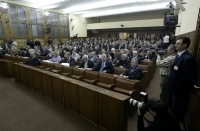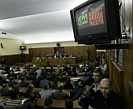- Serbia
Get to know Serbia
- Citizens
Culture and science
Health services
Pension and disability insurance
- Business
Employment
Economy
- Media
- Government
- Contact
Keep in touch
Contact form
Back
Keepin touch
Whether you have a question, comment, suggestion or any problem in the purview of the government, send us your message and we will try to respond as soon as possible. If your problem is not in our purview, we will forward your message to the relevant institution.
Q:
A:
Budget for 2009 to maintain macroeconomic stability
Belgrade,
22 December 2008
Serbian Prime Minister Mirko Cvetkovic today stated that the budget for 2009 is both restrictive and encouraging because it is a balance between current spending and development, adding that it should be viewed as one of the major packages of measures the government will make to mitigate the effects of the global crisis.
Addressing Serbian MPs prior to the debate on the bill on the 2009 budget, Cvetkovic recalled that the government has prepared measures to help Serbia survive the crisis as painlessly as possible.
He stressed that the budget is restrictive when it comes to state expenditure, which should be as low as possible, while it encourages the economy to overcome the difficulties and maintain the projected growth rate.
He said the government has not given up on the development component for the economy, adding that the main investment priority in this field will be Corridor 10.
The budget for 2009 was drafted on the basis of three principles, i.e. that of unity within the ruling coalition, solidarity and continuity, which means the economic situation will be constantly monitored and additional measures taken if there is need for that, explained the Prime Minister.
He told the press that if parliament does not adopt the bill on the budget for the next year, Serbia will have to be on provisional financing.
He explained that provisional financing is not a matter of the government, but is simply legally inevitable. However, he said he is optimistic and expects that parliament will adopt the bill within the deadline.
The budget proposal is the government’s first measure to alleviate the global crisis and once we determine the full impact of the crisis we will see whether the budget needs to be amended, he explained.
Minister of Finance Diana Dragutinovic called on MPs to adopt the 2009 budget bill and amendments to five tax-related bills. Dragutinovic said that revenues in the budget should amount to nearly RSD 698.8 billion, while expenditures should be RSD 748.8 billion, which means the deficit will be below RSD 50 billion.
The largest spending will be for social care (34.8% of the budget) and for capital expenditures (around RSD 40 billion), she said. She also commented that the global economic crisis will negatively affect the Serbian economy.
The Minister recalled that the government and the central bank, in order to alleviate the effects of the global economic crisis, undertook a series of measures, including the stand-by arrangement with the International Monetary Fund. Public consumption needs to reduce, she noted, adding that the budget is very restrictive and that public servants cannot count on salary increase or bonuses in 2009.
Deputy Prime Minister and Minister of Science and Technological Development Bozidar Djelic said there will be enough funds in the 2009 budget to continue with education reforms.
He said that 4.5% of GDP has been set aside for education, admitting, however, that 0.3% of GDP allocated to science is insufficient, but will have to do for the time being.
He added that funds for scientific development and young talents will have to be provided from multiple sources.
He stressed that the budget is restrictive when it comes to state expenditure, which should be as low as possible, while it encourages the economy to overcome the difficulties and maintain the projected growth rate.
He said the government has not given up on the development component for the economy, adding that the main investment priority in this field will be Corridor 10.
The budget for 2009 was drafted on the basis of three principles, i.e. that of unity within the ruling coalition, solidarity and continuity, which means the economic situation will be constantly monitored and additional measures taken if there is need for that, explained the Prime Minister.
He told the press that if parliament does not adopt the bill on the budget for the next year, Serbia will have to be on provisional financing.
He explained that provisional financing is not a matter of the government, but is simply legally inevitable. However, he said he is optimistic and expects that parliament will adopt the bill within the deadline.
The budget proposal is the government’s first measure to alleviate the global crisis and once we determine the full impact of the crisis we will see whether the budget needs to be amended, he explained.
Minister of Finance Diana Dragutinovic called on MPs to adopt the 2009 budget bill and amendments to five tax-related bills. Dragutinovic said that revenues in the budget should amount to nearly RSD 698.8 billion, while expenditures should be RSD 748.8 billion, which means the deficit will be below RSD 50 billion.
The largest spending will be for social care (34.8% of the budget) and for capital expenditures (around RSD 40 billion), she said. She also commented that the global economic crisis will negatively affect the Serbian economy.
The Minister recalled that the government and the central bank, in order to alleviate the effects of the global economic crisis, undertook a series of measures, including the stand-by arrangement with the International Monetary Fund. Public consumption needs to reduce, she noted, adding that the budget is very restrictive and that public servants cannot count on salary increase or bonuses in 2009.
Deputy Prime Minister and Minister of Science and Technological Development Bozidar Djelic said there will be enough funds in the 2009 budget to continue with education reforms.
He said that 4.5% of GDP has been set aside for education, admitting, however, that 0.3% of GDP allocated to science is insufficient, but will have to do for the time being.
He added that funds for scientific development and young talents will have to be provided from multiple sources.
-
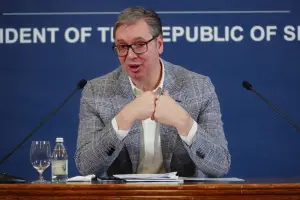 Belgrade, 4 January 2026
Belgrade, 4 January 2026Violation of UN Charter has become dominant principle of contemporary politics
-
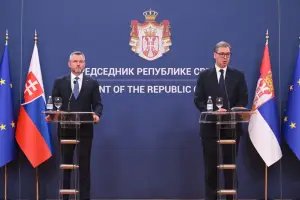 Belgrade, 21 December 2025
Belgrade, 21 December 2025Strengthening cooperation with Slovakia in many areas
-
 Belgrade, 21 December 2025
Belgrade, 21 December 2025President of Slovakia ceremonially welcomed in front of Palace of Serbia
-
 Belgrade, 18 December 2025
Belgrade, 18 December 2025Vučić welcomes President of Georgia in front of Palace of Serbia
-
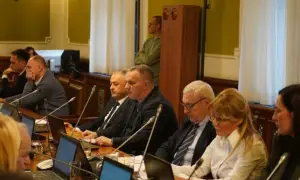 Belgrade, 15 December 2025
Belgrade, 15 December 2025Serbia needs strong, stable education system
-
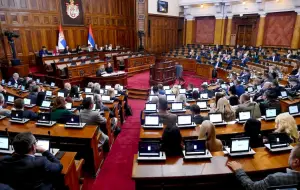 Belgrade, 3 December 2025
Belgrade, 3 December 2025Parliament adopts 2026 budget
-
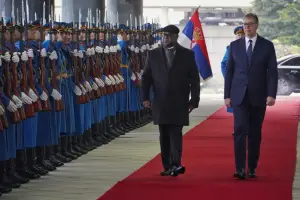 Belgrade, 28 November 2025
Belgrade, 28 November 2025Serbian President welcomes President of DR Congo
-
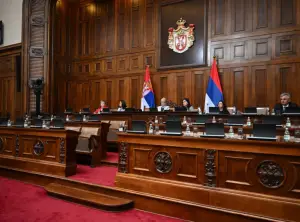 Belgrade, 7 November 2025
Belgrade, 7 November 2025Parliament adopts multiple laws
-
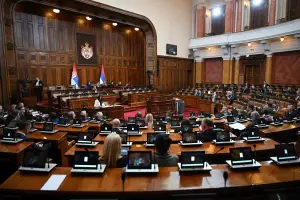 Belgrade, 22 October 2025
Belgrade, 22 October 2025Parliament adopts several laws, ratifies multiple international agreements
-
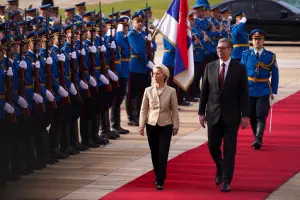 Belgrade, 15 October 2025
Belgrade, 15 October 2025Vučić welcomes Ursula von der Leyen in front of Palace of Serbia

